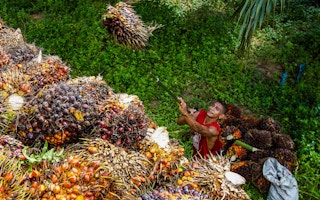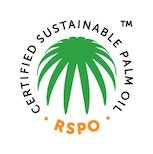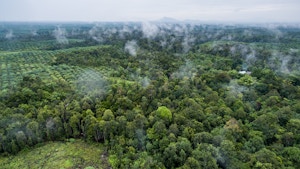Smallholders certified by the Roundtable on Sustainable Palm Oil (RSPO) are already largely in line with emerging regulatory requirements that focus on environmental sustainability and have been since 2013.
Certified smallholders protect, conserve and enhance the ecosystems that they operate in, and should be helped to continue to do so, especially as international regulations come into force.
With 40 per cent of the world’s total palm oil cultivation areas being managed by smallholders, envisioning a sustainable palm oil industry without placing smallholders at the heart of regulations and strategies is simply untenable.
Smallholder inclusion and international regulations
To become RSPO Certified, smallholders must provide geo-coordinates for their concessions and evidence of ownership or rights to land. This is precisely what one new regulation, the European Union’s Regulation on Deforestation-free Products (EUDR), requires for all products of the seven commodities (including palm oil) covered by the regulation.
However, under EUDR there are very real concerns that smallholders might be excluded from global markets such as the EU. These concerns are also shared by the coffee sector, rubber sector, and the cocoa sector. While there are some certified smallholders who would find it easier to comply with EUDR requirements, for example those who already have a working relationship with a certified mill, much attention and commitment are still needed to ensure the inclusion of all smallholders.
With the right tools and access, smallholders can leverage opportunities for the sustainable production and consumption of palm oil. The RSPO’s goal is to support smallholders by making sustainable practices a way of enhancing their livelihoods, to give them a route to certification that works for them, and ultimately create opportunities to access a global market.
Give credit where it’s due: Independent Smallholder (ISH) Credits bridge the gap between smallholders and the market
So they don’t spoil, fresh fruit bunches (FFBs) must be processed within 48 hours. Since many smallholders do not operate close enough to a certified mill to process their FFB in a timely manner, or there is simply no certified mill in their vicinity, this limits the ability of some smallholders to maintain their FFB through a certified physical supply chain. IS Credits are an RSPO solution that bridges the gap between smallholders and certified buyers, through a smallholder premium. In 2022, over US$5.5 million (representing 194,805 MT) in IS Credits were sold.
Certified smallholders who sell to uncertified mills obtain a lower price since the certified FFB will be sold as conventional fruits (sold cheaper as uncertified). So that smallholders are never denied the opportunity to benefit from their own sustainable best practices, the RSPO Credit mechanism allows certified smallholders to convert 1 tonne of their FFB volume to 1 Credit in addition to the sale of their physical supply. Buyers can then purchase the Credit (similar to carbon offsetting) at a premium from the smallholders. So far, 22 per cent of palm oil imports to the EU are RSPO Credits. In fact, Europe is the largest buyer of ISH Credits accounting for 42 per cent of purchases. The project has helped build the market bridge between nearly 100 per cent (15,000+) of Indonesian smallholder groups and European buyers. RSPO ISH Credits represent a practical and straightforward solution to engage with smallholders and support them to overcome the real-world limitations that they face towards RSPO Certification.
There are two broad ways to support sustainable palm oil production. Through sourcing the certified physical supply itself, and by providing credit mechanisms that reward producers for certified, sustainable production. The EUDR will be a significant driver of behaviour change in the industry. As a trade regulation, however, its focus is solely on physical supply.
When buyers of RSPO Credits, such as consumer goods manufacturers and retailers purchase RSPO credits, they compensate for the volume of conventional (uncertified) oil palm products actually used in their products. Before EUDR, this credit mechanism was a means for smallholders to prove that they were producing palm oil using sustainable practices.
After implementation of EUDR, buyers can still purchase RSPO Credits as long as they can demonstrate that the non-certified material that is being covered by the credit is EUDR compliant. However, there is the risk that since the physical supply of palm oil will be proven to be EUDR compliant, there will no longer be any significant incentive for buyers to purchase ISH Credits. This means that buyers could exclude smallholders with no access to certified mills or other means to prove compliance.
While there are other ways to support smallholders, ISH Credits are a proven, practical and well-targeted method of providing economic relief and inclusion in the sustainable production model. Should companies decide that systems like the RSPO ISH Credit system aren’t worth the investment, it’s the smallholders who will suffer as their livelihoods dwindle. And since smallholders represent such a significant amount of palm oil production, their exclusion could slow progress towards global environmental goals.
Cooperate for success: Making the EUDR work for smallholders
The European Commission (EC) acknowledges the need for stakeholder cooperation to help smallholders survive under the EUDR. Preamble 21 says that the EC will work “in cooperation with international organisations and bodies as well as relevant stakeholders” to help with compliance.
Being one such international organisation, the RSPO is ready to cooperate with the EC to protect smallholder livelihoods from any risk that might come from the EUDR. The RSPO can help to set up dialogues, arrangements and roadmaps between the EC and smallholders. It can also provide verifiable information to enable investment in independent smallholders, to further encourage the adoption of sustainable practices.
By working together, the RSPO and the EU can ensure that smallholders are included in a deforestation-free, sustainable EU market. Ensuring that their livelihoods can continue to flourish under new regulations and avoiding a scenario where companies see smallholder exclusion as a means to de-risk their supply chain from EUDR non-compliance.
At the RSPO’s 2023 Roundtable Event, which runs from 20-22 November, we invite interested stakeholders to attend our Plenary discussion on ‘Bridging the Gap and Empowering Smallholders to Succeed Amidst Tightening International Regulations.’
Everyone has a role to play in improving smallholder inclusion and securing their livelihoods under international regulation. The RSPO calls on all stakeholders and regulatory bodies to take part in global strategies to support smallholders. We all have a responsibility to ensure that regulatory changes do not exclude smallholders, whose role in the global sustainable palm oil transition is crucial.
Guntur Cahyo Prabowo is head of smallholders for the Roundtable on Sustainable Palm Oil




















